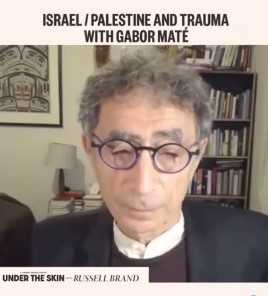Back in 2021, on an episode of Under The Skin podcast (hosted by famous British celebrity Russell Brand), renowned physician and author, Dr Gabor Maté spoke about the Israel-Palestine conflict.
He starts of talking about his past as being a Holocaust survivor; as an infant who lost much of his extended family in the gas chambers in Auschwitz.
This trauma led to him being initially a Zionist supporter in his youth. He explained how the idea of an exclusively Jewish nation-state with strong borders and powerful army in their resurrected historical homeland appealed to traumatized Jewish people who saw this vision as a replacement for the barbed wires of Auschwitz.
“And then, Maté says, “I found out it wasn’t exactly like that.”
He goes on to explain how the very concept of Israel is inherently violent and oppressive.
There is no way you can create a Jewish-only state without displacing, dispossessing and torturing the local Palestinian population. He asserts that this is a fact that Israeli and Jewish-Israeli historians themselves have proven that since its very inception itself, the oppression against Palestinians has been persistent. Israel was formed by an incredibly violent incident of mass displacement and killings called Nakba in Arabic (meaning catastrophe).
He goes on to narrate his two-week visit to the occupied territories during the First Intifada and how he wept daily at the brutality of the Israeli occupation that he witnessed. How ordinary Palestinians were oppressed at many different levels, economically (burning olive groves, denting water rights) as well as politically (being imprisoned, humiliated, etc.)
This was not a one-off incident or phase; rather Israel’s oppression of Palestinians has remained consistent throughout the last 70 years.
He points out the hypocrisy of the Israeli nation-state that readily grants citizenship to any Jewish person in the world but does not allow Palestinians who are born in occupied-Palestine to visit their own homeland.
He cites the examples of Israeli historians, former soldiers and pilots who resigned from the army and testified publicly about the various crimes against humanity that Israel perpetuates.
He mentions how public intellectuals and scholars like Norman Finkelstein have faced adverse consequences for criticizing Israel’s policies. He also drew attention to the hypocrisy of Western media and governments that deem it an offense to deny the Holocaust but do not extend this same principle when it comes to atrocities against Palestinians. It is considered a crime to remember the Nakba. Western press valorises Hong Kong protestors for opposing their police forces, the people of Myanmar for opposing their oppressive military but when Palestinian children resist Israeli military by throwing rocks, they are labelled “terrorists”.
He mentions how Gaza is considered the world’s largest open-air prison and how teenagers are jailed for months and years on end, not allowed to meet their families.
He reiterates that calling out Israel cannot be equated with anti-Semitism.
He wishes more non-Jewish people would speak up about Palestine fearlessly without worrying about being charged of anti-Semitism.
This is a question of whether you are in favour of justice, truth and freedom or not.


